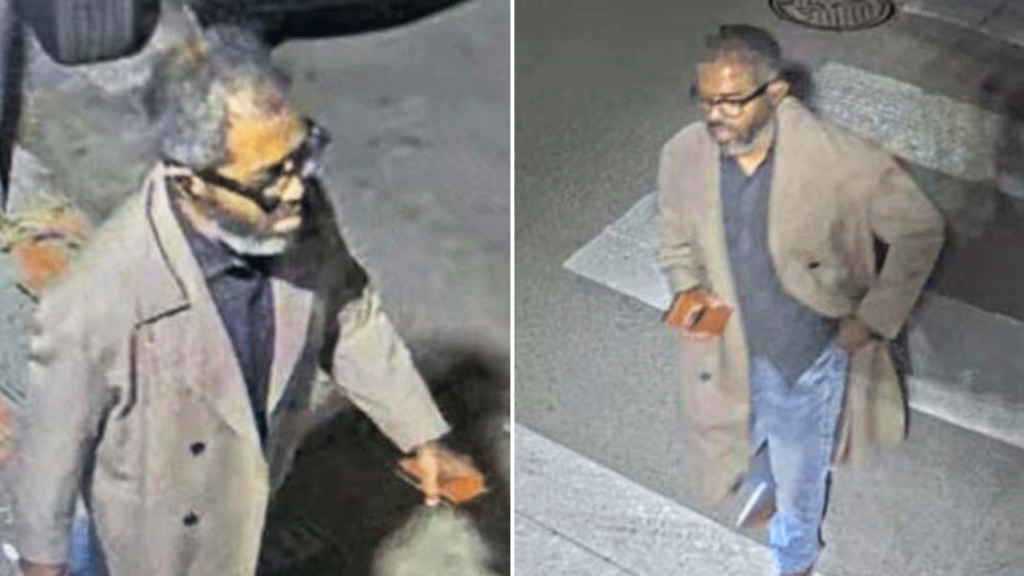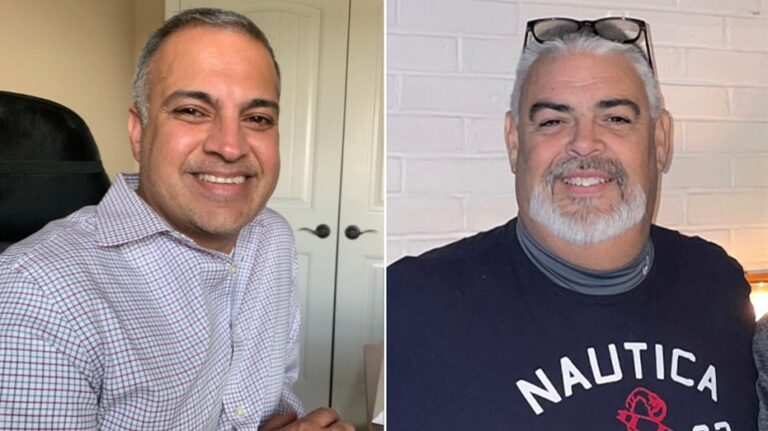
A 42-year-old Texas consultant named Shamsud-Din Jabbar drove through a crowd of New Year’s revelers in New Orleans as they celebrated the beginning of 2025 — flying an ISIS flag from the hitch of his rented pickup while killing 14 and injuring another 30.
On the 350-mile drive from Houston to the Big Easy, Jabbar recorded selfie videos declaring his allegiance to ISIS and saying he initially planned to kill his own friends and family but decided on attacking innocent members of the public in order to attract more attention to what he called a “war between the believers and the disbelievers,” according to the FBI.
He was a U.S. Army veteran and had a lucrative job at a major consulting firm, but he brought a pair of IEDs and two firearms with him to attack civilians — allegedly radicalized in just weeks. And authorities are warning of similar lone wolf attacks and how deadly they can be, as New Orleans officials work to bolster security following the ramming attack on its iconic, pedestrian-packed Bourbon Street.
“ISIS and others are back,” James Jay Carafano, an expert on national security and foreign policy, warned in a recent Fox News op-ed. “Biden’s humiliating withdrawal from Afghanistan reignited the hope that America really was the paper tiger that Usama Bin Laden claimed we were.”
NEW ORLEANS TERRORIST RADICALIZED BY ISIS ONLINE WITHIN WEEKS, FBI DIRECTOR SAYS
Although the shockingly violent group’s “territorial caliphate” was destroyed during the first Trump administration, its propagandists continue to encourage and radicalize potential terrorists. Jabbar, in one of his videos, declared that he had “joined ISIS before this summer,” FBI Deputy Assistant Director Christopher Raia told reporters in a news briefing.
“The threats from international terrorism, domestic terrorism, and state-sponsored terrorism are complex and persistent — and notably, they are all simultaneously elevated,” Raia said. “We continually face threats from foreign terrorist organizations, violent extremists across the ideological spectrum, and criminal actors that aim to bring violence to the United States.”
Jabbar traveled to Cairo, Egypt, from June 22 to July 3, 2023, then returned to the U.S. In a separate trip on July 10, 2023, he traveled to Ontario, Canada, and returned to the U.S. a few days later, the FBI said during a press conference. It was unclear whether the visit was connected to the attack, but Raia said the Bureau is investigating whether Jabbar had any associates in the U.S. or overseas.
BODY LANGUAGE EXPERT SAYS NEW ORLEANS ATTACKER EXHIBITED ‘RED FLAGS’ BEFORE ATTACK
Investigators said they are still looking into how and why Jabbar became radicalized. In an interview with “60 Minutes” over the weekend, FBI Director Christopher Wray said he believes the killer was inspired by ISIS content he found on the internet.
“[Jabbar] appears to have been inspired — from afar — by ISIS, and it is, in many ways, the most challenging type of terrorist threat we face,” Wray told the interviewer, Scott Pelley. “You’re talking about guys like this, who radicalize not in years but in weeks, and whose method of attack is still very deadly but fairly crude. And if you think about that old saying about connecting the dots, there are not a lot of dots out there to connect. And there’s very little time in which to connect them.”
WHAT WE KNOW ABOUT VICTIMS OF NEW ORLEANS TERRORIST ATTACK
Wray is warning that lone wolf attacks are a major priority for the FBI and began warning of an elevated threat more than a year ago.
The New York Times earlier this month noted that the way Jabbar flew his flag, from the trailer hitch in the back of his rented Ford F-150 EV, was the same as in an ISIS propaganda poster uncovered by the Daily Mail, in 2017.
The image, which shows an SUV driving over a pile of skulls in front of an urban backdrop, includes the caption, “Run over them without mercy,” as written in English. That year saw vehicular terror attacks in London, New York City, Jerusalem, Barcelona and elsewhere.
A year earlier, an ISIS-inspired terrorist drove a truck into Bastille Day celebrations in Nice, France, killing 84.
Older terror groups, like Al-Qaeda, focused on highly planned attacks on a global scale, like Sept. 11, 2001, an earlier attack on the World Trade Center with a car bomb in 1993, according to Paul Mauro, a former NYPD inspector. ISIS promoted a shift toward small but brutal attacks that could be perpetrated anywhere around the globe.
“You didn’t have to take down the Brooklyn Bridge. You were a lion of Islam if you stabbed your neighbor because he was an apostate,” he said.
As ISIS rose to prominence, the terrorists posted horrific videos of violence that were highly produced, depicting torture and murder in extremely graphic detail.
U.S. THREAT LANDSCAPE, DOMESTIC EXTREMISM POSE A DAUNTING—BUT FAMILIAR—TEST FOR TRUMP’S SECOND TERM
But even after its defeat, the terror group continues to maintain an online presence that includes propaganda videos and a weekly newsletter, according to the Times report.
Roughly a year before Jabbar’s rampage, ISIS propagandists urged supporters to invade people’s homes and “kill them wherever you find them,” Voice of America reported at the time.
Counter-terror investigators have been fighting lone wolves inspired by such campaigns for years, Mauro said.
He’s calls it a “loser-to-lion” syndrome — radicalized lone wolves who have nothing going for them become convinced they can achieve martyrdom through acts of terror.
But even with increased surveillance and awareness of the issue, attackers can slip through the cracks.
In another New Year’s attack, on Dec. 31, 2022, a 19-year-old Maine man named Trevor Bickford drove to New York City and attacked three police officers with a machete while shouting “Allahu akbar.”
He had reportedly been on the FBI’s radar already, and earlier that year became radicalized and decided to “wage jihad.” He is serving a 27-year prison sentence.
Fox News’ Audrey Conklin contributed to this report.
A 42-year-old Texas consultant named Shamsud-Din Jabbar drove through a crowd of New Year’s revelers in New Orleans as they celebrated the beginning of 2025 — flying an ISIS flag from the hitch of his rented pickup while killing 14 and injuring another 30.
On the 350-mile drive from Houston to the Big Easy, Jabbar recorded selfie videos declaring his allegiance to ISIS and saying he initially planned to kill his own friends and family but decided on attacking innocent members of the public in order to attract more attention to what he called a “war between the believers and the disbelievers,” according to the FBI.
He was a U.S. Army veteran and had a lucrative job at a major consulting firm, but he brought a pair of IEDs and two firearms with him to attack civilians — allegedly radicalized in just weeks. And authorities are warning of similar lone wolf attacks and how deadly they can be, as New Orleans officials work to bolster security following the ramming attack on its iconic, pedestrian-packed Bourbon Street.
“ISIS and others are back,” James Jay Carafano, an expert on national security and foreign policy, warned in a recent Fox News op-ed. “Biden’s humiliating withdrawal from Afghanistan reignited the hope that America really was the paper tiger that Usama Bin Laden claimed we were.”
NEW ORLEANS TERRORIST RADICALIZED BY ISIS ONLINE WITHIN WEEKS, FBI DIRECTOR SAYS
Although the shockingly violent group’s “territorial caliphate” was destroyed during the first Trump administration, its propagandists continue to encourage and radicalize potential terrorists. Jabbar, in one of his videos, declared that he had “joined ISIS before this summer,” FBI Deputy Assistant Director Christopher Raia told reporters in a news briefing.
“The threats from international terrorism, domestic terrorism, and state-sponsored terrorism are complex and persistent — and notably, they are all simultaneously elevated,” Raia said. “We continually face threats from foreign terrorist organizations, violent extremists across the ideological spectrum, and criminal actors that aim to bring violence to the United States.”
Jabbar traveled to Cairo, Egypt, from June 22 to July 3, 2023, then returned to the U.S. In a separate trip on July 10, 2023, he traveled to Ontario, Canada, and returned to the U.S. a few days later, the FBI said during a press conference. It was unclear whether the visit was connected to the attack, but Raia said the Bureau is investigating whether Jabbar had any associates in the U.S. or overseas.
BODY LANGUAGE EXPERT SAYS NEW ORLEANS ATTACKER EXHIBITED ‘RED FLAGS’ BEFORE ATTACK
Investigators said they are still looking into how and why Jabbar became radicalized. In an interview with “60 Minutes” over the weekend, FBI Director Christopher Wray said he believes the killer was inspired by ISIS content he found on the internet.
“[Jabbar] appears to have been inspired — from afar — by ISIS, and it is, in many ways, the most challenging type of terrorist threat we face,” Wray told the interviewer, Scott Pelley. “You’re talking about guys like this, who radicalize not in years but in weeks, and whose method of attack is still very deadly but fairly crude. And if you think about that old saying about connecting the dots, there are not a lot of dots out there to connect. And there’s very little time in which to connect them.”
WHAT WE KNOW ABOUT VICTIMS OF NEW ORLEANS TERRORIST ATTACK
Wray is warning that lone wolf attacks are a major priority for the FBI and began warning of an elevated threat more than a year ago.
The New York Times earlier this month noted that the way Jabbar flew his flag, from the trailer hitch in the back of his rented Ford F-150 EV, was the same as in an ISIS propaganda poster uncovered by the Daily Mail, in 2017.
The image, which shows an SUV driving over a pile of skulls in front of an urban backdrop, includes the caption, “Run over them without mercy,” as written in English. That year saw vehicular terror attacks in London, New York City, Jerusalem, Barcelona and elsewhere.
A year earlier, an ISIS-inspired terrorist drove a truck into Bastille Day celebrations in Nice, France, killing 84.
Older terror groups, like Al-Qaeda, focused on highly planned attacks on a global scale, like Sept. 11, 2001, an earlier attack on the World Trade Center with a car bomb in 1993, according to Paul Mauro, a former NYPD inspector. ISIS promoted a shift toward small but brutal attacks that could be perpetrated anywhere around the globe.
“You didn’t have to take down the Brooklyn Bridge. You were a lion of Islam if you stabbed your neighbor because he was an apostate,” he said.
As ISIS rose to prominence, the terrorists posted horrific videos of violence that were highly produced, depicting torture and murder in extremely graphic detail.
U.S. THREAT LANDSCAPE, DOMESTIC EXTREMISM POSE A DAUNTING—BUT FAMILIAR—TEST FOR TRUMP’S SECOND TERM
But even after its defeat, the terror group continues to maintain an online presence that includes propaganda videos and a weekly newsletter, according to the Times report.
Roughly a year before Jabbar’s rampage, ISIS propagandists urged supporters to invade people’s homes and “kill them wherever you find them,” Voice of America reported at the time.
Counter-terror investigators have been fighting lone wolves inspired by such campaigns for years, Mauro said.
He’s calls it a “loser-to-lion” syndrome — radicalized lone wolves who have nothing going for them become convinced they can achieve martyrdom through acts of terror.
But even with increased surveillance and awareness of the issue, attackers can slip through the cracks.
In another New Year’s attack, on Dec. 31, 2022, a 19-year-old Maine man named Trevor Bickford drove to New York City and attacked three police officers with a machete while shouting “Allahu akbar.”
He had reportedly been on the FBI’s radar already, and earlier that year became radicalized and decided to “wage jihad.” He is serving a 27-year prison sentence.
Fox News’ Audrey Conklin contributed to this report.





